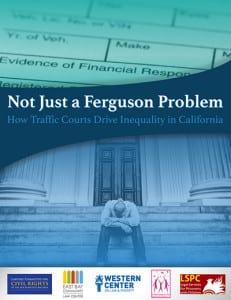
By Kirsten Mickelwait
In California, one in six drivers—4.2 million people—have had their driver’s licenses suspended due to minor traffic infractions that led to escalated fees, penalties, and court appearances. The existing policy has had a devastating and disproportionate effect on low-income and largely minority populations, forcing many into deeper levels of poverty.
Such are the findings of a new report, Not Just a Ferguson Problem: How Traffic Courts Drive Inequality in California, released in April by the East Bay Community Law Center (EBCLC) and a coalition of other legal-aid organizations. The nationwide media exposure given to the 29-page report prompted Chief Justice Tani G. Cantil-Sakauye on May 18 to ask the Judicial Council of California to take emergency action to adopt a rule of court to facilitate access to justice for court users challenging traffic fines. In addition, the California State Legislature is considering SB-405, which would enable people to regain their driver’s licenses through an amnesty program that will allow payment plans and reduce accumulated fines by 50 percent.
Traffic courts as de facto revenue source
Even such minor infractions as missing license plates, littering, or jaywalking can result in suspended licenses if the driver cannot afford to pay. With the extra fees added to every citation, a $100 ticket automatically rises to $490. After one missed deadline, the courthouse doors are closed to the individual, even if unable to appear due to work or illness. The driver’s license is suspended until the fine is paid in full, and the fine increases again, regardless of the reason for the missed deadline. That original $100 ticket now costs $815.
According to EBCLC Director of Programs Elisa Della-Piana, the center has seen a strong increase in clients with suspended licenses in recent years – from one or two people per month to about ten people per week. A report issued in March by the U.S. Department of Justice Civil Rights Division called attention to disproportionate numbers of traffic stops and arrests of African-Americans in Ferguson, MO, revealing that the city had used its traffic courts as a de facto revenue source. Della-Piana said that the Ferguson coverage allowed EBCLC to bring attention to similar problems in California, where previous bills had not made much progress toward solving the problem.
“Both AB-2724 and SB-366 addressed this issue, but neither bill got out of appropriations,” Della-Piana said. “In part because of the national media attention generated by our report, the governor has proposed an amnesty program and SB-405 passed unanimously out of committee. That was the outcome we were hoping for, to inspire greater political leverage.”
Offering amnesty for nonviolent offenses
Sponsored by Senator Robert M. Hertzberg, SB-405 will create an amnesty program to enable victims to get out of the cycle of poverty created by unfair traffic court laws. Among other measures, it will restore driver’s licenses suspended on or before January 1, 2013 due to nonviolent offenses. For those who participate in the program, it will allow license restoration and use an income-based sliding scale for fines. A similar proposal is in the Governor’s proposed budget.
Third-year Berkeley Law student Luke Diamond has worked directly with many who were caught in the traffic law Catch-22. He recalls one client, a formerly homeless woman who was caught drinking in the back seat of her parked car, where she was living at the time. “She was rebuilding her life with a dog-walking business when she lost her license due to unpaid fines and was faced with losing her income,” he said. “EBCLC was able to get her citations waived through the Alameda County Homeless and Caring Court but that program can help only a tiny fraction of the people who are caught in this cycle.”
Racial bias at every level
“The issue of racial disparity is big,” said Della-Piana. “There is racial bias at every stage of this process, from the number of traffic stops, the people who are cited or arrested, and the number of cars getting towed. Some data shows that you’re twice as likely to be stopped if you’re Hispanic, and four times as likely if you’re African-American.” She said that EBCLC is working on both local and statewide advocacy to improve outcomes for the 17 percent of Californians who are affected by these unfair policies.
Founded in 1979 by Berkeley Law students, the East Bay Community Law Center offers both clinical experience and academic credit for students. “The Not Just a Ferguson Problem report illustrates just how critically important these issues are,” said EBCLC Faculty Director Jeff Selbin. “A community clinic like EBCLC is the best place both to identify these kinds of on-the-ground harms and to figure out what we can do to address them.”
Also contributing to the report was Western Center on Law & Poverty, A New Way of Life Reentry Project, Lawyers’ Committee for Civil Rights, and Legal Services for Prisoners with Children.